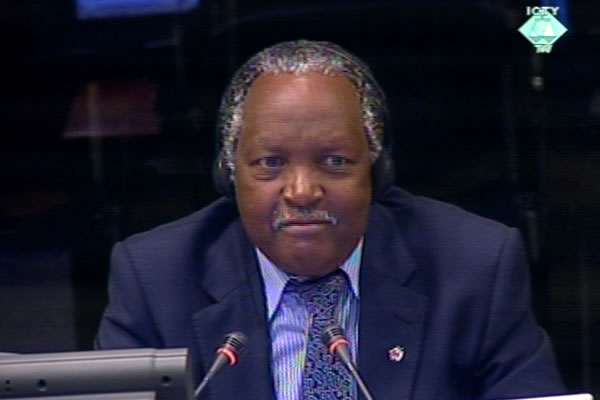Home
‘VOLUNTARY’ EXODUS
In the cross-examination of Charles Kirudja, the accused Radovan Karadzic tried to prove that the non-Serbs from Bosanski Novi and other towns in northwestern BH left their homes ‘voluntarily’. Kirudja dismissed Karadzic’s claim that those people moved out in line with the law in force at the time and that they actually wanted to move out. Kirudja repeated his previous conclusion: it was a case of ethnic cleansing
 Charles Kirudja, witness at the Radovan Karadzic trial
Charles Kirudja, witness at the Radovan Karadzic trial Radovan Karadzic tried in the cross-examination to contest the conclusion of the former UN official Charles Kirudja that in the summer and fall of 1992, the Serb authorities ethnically cleansed northwestern BH. Karadzic claimed that the non-Serbs demanded to be allowed to leave their homes ‘voluntarily’. The Serb authorities ‘allowed them to do it’ because the law in force at the time obliged them to evacuate the civilians from combat zones.
The former civil affairs coordinator in the UN Sector North repeated what he said in 2003 in his evidence at the trial of Radoslav Brdjanin. According to Kirudja, in 1992 UN members were deployed in 1992 in Sector North along the Croatian-BH border. The UN members witnessed the mass exodus of non-Serbs from northwestern BH that started in May 1992. Kirudja also said that the Serb authorities asked the UN to help them in what they claimed was an ‘evacuation’ of the people. However, the witness stressed that, based on his conversations with hundreds of refugees, he clearly understood that they had not left voluntarily.
Kirudja said that Radomir Pasic, mayor of Bosanski Novi, informed him of a ‘new reality’ in BH: a new Serb republic was established and the Muslims refused to pledge loyalty to the new authorities. Pasic demanded that the UN provide assistance in the transfer of the non-Serb population to ‘third countries’ through Croatia. Pasic also told Kirudja that ‘everything will be resolved’ once Kirudja and other UN staff ‘realize that Serbs and Muslims can’t live together’.
Karadzic called Kirudja’s report from early July 1992 ‘partial’. In the report, Kirudja informed his superiors in the UN headquarters in Zagreb about ‘the constant stream of reports about the existence of alleged concentration camps in Keraterm, Trnopolje, Omarska, Manjaca and other places’ where Muslim detainees were abused, tortured, killed and held in inhumane conditions. According to Karadzic, these were ‘uncorroborated stories’ told by the Muslim refugees given too much weight only because the UN reported them.
Kirudja disagreed with Karadzic’s assessment that the report was ‘partial’. When General Satish Nambiar, UNPROFOR commander, received the report he called Kirudja and asked him to explain why the term ‘concentration camp’ was used. Kirudja explained to General Nambiar that the people who were in the prison camps used the word ‘concentration camp’ and that he merely quoted their words in his report. Kirudja added that he didn’t know how his report was made public.
The accuracy of the report and the information that was broadcast by the media were finally verified by the journalists who visited the prison camps in Omarska and Trnopolje in August 1992, following Radovan Karadzic’s ill-advised invitation. British journalist Ed Vulliamy testified about it earlier this week.
The trial of Radovan Karadzic for genocide and other crimes in BH continues on Wednesday, 16 November 2011.
Linked Reports
- Case : Karadzic
- 2011-11-10 EXODUS OF NON-SERBS FROM BOSANSKI NOVI
- 2011-11-09 RADOVAN KARADZIC MEETS ED VULLIAMY FOR THE SECOND TIME
- 2011-11-08 WITNESS: WE HAD TO WAIT FOR ‘MORE PROPITIOUS MOMENT’ TO PUNISH CRIMES
- 2011-11-14 KARADZIC SEEKS YET ANOTHER SUSPENSION OF TRIAL
- 2011-11-16 PREPARATIONS FOR JOURNALISTS’ VISIT TO PRISON CAMPS
- 2011-11-17 MILITARY IMPLEMENTATION OF STRATEGIC GOALS
